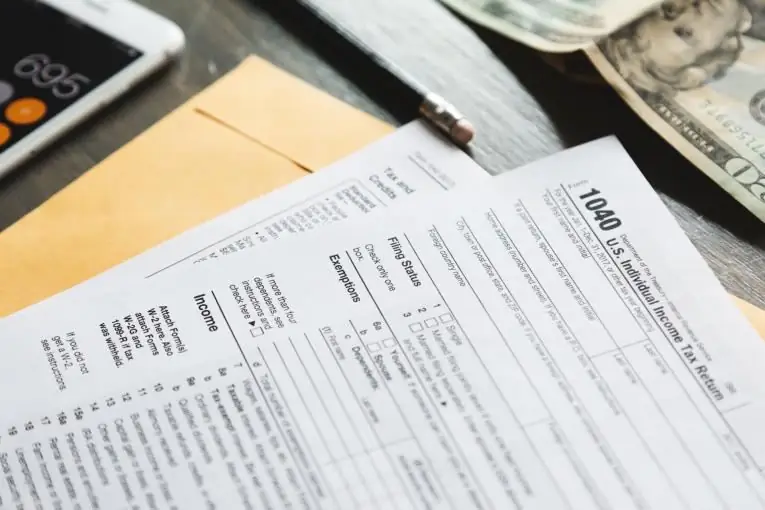2026 Author: Howard Calhoun | [email protected]. Last modified: 2025-01-24 13:10:32
The write-off of receivables in tax accounting is a procedure carried out by accounting specialists on a regular basis. Accounts receivable are cash owed to the organization by counterparties. In other words, accounts receivable in the Tax Code are the company's assets that have been withdrawn from circulation.
Features
Given inflation, this phenomenon has a negative impact on the financial position of the enterprise. The situation is exacerbated when it becomes unrealistic to collect tax receivables from those who owe. Due to the many features of the process, enterprises always have questions. An example of a debt cancellation order is shown in the photos attached below.
Procedure of actions
Money is withdrawn, guided by the laws in force on the territory of the Russian Federation, established by the Civil Code. This is done in strict order. As of the date of expiry of the statute of limitationswrite:
Debit 63 "Reserves for doubtful debts"; Loan 62 “Settlements with buyers and customers” (60 “Settlements with suppliers and contractors”, 76 “Settlements with other debtors and creditors”, etc.) - funds that cannot be withdrawn are written off from reserves.
Sometimes there is a situation when there is not enough money in the reserve. Then draw up the postings:
Debit 91 “Other income and expenses”; Credit 62 (60, 76, etc.) - a debt that cannot be withdrawn is written off. Debit 007 “Debt written off at a loss of insolvent debtors” - take into account debt that cannot be collected in order to wait for the moment when the situation changes and this becomes possible.
If the person subsequently pays the money, they write in the account:
Debit 51 "Settlement accounts"; Credit 62 (60, 76, etc.) - funds were received from the debtor. Debit 62 (60, 76, etc.); Loan 91 - received debt is included in other income; Loan 007 - written off bad debt repaid by the debtor.

How is bad debt recognized?
The tax code for receivables regulates a separate list of procedures. Article 265 of the Tax Code of the Russian Federation states that non-operating expenses are considered losses that were received for different time periods. This includes bad debts. But the situation improves if the organization has already formed provisions for doubtful debts. Then new write-offs are offset by reserves, which becomes profitablefor a legal entity.
Declare their special grounds for recognizing accounts receivable in accounting and tax accounting as uncollectible. So, it is possible to recognize it as such if the following items are present.
- The statute of limitations is running out.
- Obligations are terminated due to the fact that they can no longer be fulfilled.
- Obligations are terminated due to the decision of a government agency.
- Obligations are terminated due to the abolition of the enterprise.
For another reason, receivables and payables in tax accounting are not considered hopeless.

Interestingly, accounting does not contain the concept of "bad" debt. But the PBU determines that the other expenses of the enterprise include accounts receivable with an expired limitation period and other debts that are no longer possible to recover. Since the laws of the Russian Federation do not give the concept of “unrealistic debt collection”, enterprises themselves determine and approve it. But it must be remembered that a personal definition of the concept sometimes leads to the fact that it becomes necessary to apply PBU. Therefore, the best situation is when the criteria for write-offs of bad receivables in tax accounting and in accounting will be the same. There is always a reason why they determine its hopelessness.
Limitation period
In the Civil Code of the Russian Federation, the limitation period is a temporary period intended to protect the rights of the victim. She kicks off as soon as the man acknowledgedviolation of your rights.
Usually the term is 3 years. However, sometimes the law provides for different periods of time for different cases. For example, if the work was improperly performed, then the limitation period is 1 year from the moment the customer accepted the results of the activity, or from the moment he announced the presence of shortcomings in the results.
If we are talking about shipping, then it will also be 1 year. The moment from which it begins to be counted is decided by the code, as well as the transport charter. For example, in cases where the agreement does not reveal the moment at which the obligation must be performed, then it is considered that the procedure must be carried out within a reasonable time.

It is not uncommon for statute of limitations to be suspended and then restarted. The time that has passed before the pause is not taken into account in the new term. Most often this happens when the debtor confirms that he has a debt. This he can do in the following ways:
- Pay some of the debt.
- Pay late interest.
- Contact the lender on this matter.
- Sign the act of debt reconciliation.
- Declare offset of mutual claims.
- Agree to debt restructuring.
Usually, when the relevant authorities review the progress of a case, confirmation is required from taxpayers that everything possible has been done to recover the amount owed.
The laws in force on the territory of the Russian Federation establish that there is no relationship betweenwrite-offs of money and the presence of similar actions of taxpayers. Since the legal fact that the debt is not recoverable is confirmed by a circumstance that has already been established in the case, it is recognized as hopeless anyway. And representatives of the tax authorities do not question this. There is no basis for recognizing that taxable profits will be reduced by writing off debt to non-operating expenses after the statute of limitations expires.
However, in order to recognize the bad debts using this basis, the company undertakes to provide a number of documents that will help identify the date the debt appeared. Usually this includes invoices for payment, acts of delivery and acceptance of work, provision of services.
Official act
Obligations are subject to termination when it is not possible to fulfill them, if this is provoked by reasons beyond the control of the actors. This includes force majeure, force majeure circumstances: natural disasters, emergencies, fires. For example, when rental properties burn down, rental obligations end.
The same consequences occur if the debtor dies, and execution is impossible without his direct participation. This happens if the obligation is closely related to his personality.
The next condition leading to the termination of obligations is special official acts. These include acts of the Bank of the Russian Federation, legal acts. The following question often arises: when the debtor is deprived of the right to fulfill his obligation due to the loss of a license,then debts are also considered bad?
In these conditions, you need to take into account a number of points. It would seem that the inability to fulfill the obligation was provoked by a circumstance for which the counterparties could not be fully responsible. However, the license is revoked only when a person acts illegally. Therefore, failure to fulfill an obligation in this case is never considered a good reason for recognizing the end of obligations on the basis of an act of an official body. Therefore, it is important to take into account the guilt of the one who lost the license. If, as sometimes happens, guilt is not proven, the hopelessness of debts is recognized. But practice shows that most often the licensee is responsible for this.
Executive proceedings
If the creditor wins in the trial, the loser pays the money that he owes on these grounds. Otherwise, the decision is enforced. There is an important question here: are court rulings considered sufficient grounds for recognizing bad debts and classifying them as non-operating expenses of an enterprise?
Bailiffs sometimes return writ of execution due to the inability to recover the amount, and the second time you can demand recovery in the next three years. This action terminates the time limit. The bailiffs have no reason to refuse to accept documents for execution. The bailiffs will start proceedings again, give a new document if it is not possible to recover the money.
Because of this, the issuance of acts does not lead to giving the debtor the right not to return debts. They are onlyemphasize that at this point in time the bailiff was unable to recover funds from the counterparty. When the production ends, supporting documents are available, this does not lead to the release of the counterparty from fulfilling the obligation. He is left with the obligation to repay the debts.
Abolition of the enterprise, which should
Another criterion for the impossibility of fulfilling an obligation is the abolition of the enterprise, when rights and obligations are not transferred to other persons.

Enterprise may cease to exist as a result of:
- Going through bankruptcy proceedings.
- Founders' decisions.
- Decisions of the judicial authority, if violations were found in the creation of a legal entity or lack of a license. An organization is abolished if it grossly violates the law.
In this case, the creditor is obliged to declare his right to these funds. They are written off after the company-debtor is liquidated. Then the court order is considered the basis for collection.
The law on state registration indicates that an enterprise is considered liquidated only from the moment when an entry confirming this was made in the Unified State Register of Legal Entities. Until this moment, the cancellation of debts is considered illegal.
Exclusion of a legal entity from the Unified State Register of Legal Entities
Another separate ground is the deletion of the company from the register. All legal entities that have not submitted tax returns over the past 12 months are excluded from the Unified State Register of Legal Entities. It is also necessary that they do not performno action on your deposits.
When bad debts are written off
Sometimes the statute of limitations expires and the taxpayer discovers it much later. When this happens, you need to decide for what period the debts are recorded and whether they are classified as non-operating expenses.
Article 272 of the Tax Code determines that expenses are included in the period when they arose according to the specifics of the transaction. Bad debts are taken into account when forming the tax base for income. It is also included in non-operating expenses. At least one reason is required to classify a debt as uncollectible.
The Tax Code of the Russian Federation defines the date on which bad debts were recognized as the date of the tax period in which losses occurred - the limitation period expired, and obligations ended due to the fact that it became impossible to fulfill them.
There is no other way to recognize bad debts. In cases where the inventory is not carried out in a timely manner, this fact does not affect the date on which the bad debt is recognized. It is because of this that the amounts with an expired claim are reimbursed in the tax period that has already passed. Otherwise it will be illegal. In the Tax Code of the Russian Federation, expenses are attributed to the time period when the obligations occurred. Liabilities were the reason for identifying bad debts.
The taxpayer further undertakes to provide income tax returns for the periods during which the debt should have been written off. If foundinaccuracies in the design of tax bases relating to the past tax period, then recalculate, calculate the amount of tax. This is done for the period in which inaccuracies were made.
Regardless of the periods when errors were discovered, the company has the right to file revised tax returns, including the amount of the identified debt in non-operating expenses. This is how taxpayers calculate the tax base for a particular period anew. This helps to reduce income taxes.
However, a number of officials say that the write-off of bad debts is carried out in the same time period in which the taxpayer began to have the right to do so. Other judiciaries tend to think that tax debt write-off laws do not declare the exact time period in which money can be written off. Indeed, there are no strict regulations.
What debt is written off
Only a part of receivables can be written off in tax accounting. Its hopelessness for the implementation of such an operation necessarily needs official recognition. It should also be borne in mind that such debts are considered to be the debts of organizations that have already been excluded from the Unified State Register of Legal Entities after September 1, 2014. If it was excluded from there before this date, then the write-off of overdue receivables in tax accounting occurs on a general basis.
If the individual entrepreneur owes money, then the procedure is not carried out. This is due to the fact that the IP is responsible forpersonal property debt. Writing off uncollectible receivables in tax accounting from a merchant is carried out only in two cases. Which ones exactly? When he went bankrupt or died. These are the most important grounds for writing off receivables in the Tax Code. Sometimes this process is carried out after a court order. This happens when the court recognizes that it is unrealistic to write off the overdue tax receivable from the merchant, since his whereabouts are unknown. Therefore, it is important to make sure that the circumstances for the procedure are present before doing this.
Obligor enterprises
Sometimes partners must become each other. Then, in all cases, the amounts are calculated by reducing the receivables in the amount of money they owe to the partner. If, having completed this procedure, the counterparty remains indebted, then the amount is considered impossible for withdrawal, and tax debts are written off. If there is information that the one who owes went bankrupt or was expelled from the Unified State Register of Legal Entities after September 1, 2014, then it becomes clear that the amount is not refundable. The situation is somewhat different when the statute of limitations expires. Be sure to take into account that it lasts 3 years. If it was suspended, started again, then it cannot exceed 10 years under any circumstances.
Documentation
When it was determined the presence of money that is not possible to withdraw, act as follows. In order to write off accounts receivablethe debt of the Tax Code of the Russian Federation requires the preparation of an inventory act. The results of this work are entered in the INV-17 sheet. Further, the managing person issues an order liquidating the debts of the legal entity. In the accounting statements, the full amount is prescribed, a description of the situation, on what grounds the debt is written off, the data of the order are noted.
You need to know that all the money written off in this way is checked by representatives of the tax authorities with particular care. Tax requires a breakdown of receivables and payables. So this point needs a lot of attention.
It is for this reason that for the competent write-off of receivables in tax accounting, it is important to attach a history of debts to the order, documents that confirm the reality of transactions. Usually, the package of documents includes a lot of contracts, invoices, invoices, acts on the provision of services, reconciliation acts. Important is the application that will show the hopelessness of receivables for tax accounting. This includes extracts from the Unified State Register of Legal Entities, as well as decisions of bailiffs.
In accounting
The order of actions in the accounting of the enterprise will depend on the availability of reserves for doubtful debts most often. If any, then make entries: Debit 63; Credit 62 (76 or other accounts for accounting debt to the company). They are called accounts receivable write-off transactions in tax accounting.

If the amount of debt is greater than the reserves, then they write: Debit 91.2; Credit 62 (or other debt account). These postingswriting off accounts receivable in tax accounting is necessary.
Written-off debts for 5 years are taken into account in the Debits of account 007 in full. When the term expires, it is permanently written off.
In cases where there are no reserves, postings are made: Debit 91.2; Loan 62 - unrealistic receivable funds were written off as expenses; Debit 007 - written-off debt is taken into account off the balance sheet.

Each document that serves as confirmation of the collection of these funds is kept for at least 5 years for accounting purposes. Analytical accounting is kept on account 007, taking into account counterparties.
In tax accounting
Receivables that are unrealistic to receive funds can be added to expenses by legal entities that recognize income taxes on an accrual basis. Therefore, it is impossible for simplistic people and payers of UTII to take into account bad debts in expenses. Individual entrepreneurs do not have the right to carry out the procedure for writing off receivables in the supplier's tax records, for example.
Liquidate accounts receivable, given the availability of reserves for doubtful debts. If available, the amount is written to it, and the remaining amounts of the debt will be attributed to non-operating expenses. If there are no reserves, then the receivable is written off at the expense of non-operating expenses.
Expenses are recognized as the dates of the earliest events approach:
- Expirations of the statute of limitations.
- Appearance in the Unified State Register of Legal Entities of records that the work of the debtor has been terminated.
- Receipt of documents fromcourt.
Documents that confirm these data, taking into account the laws on writing off tax debts, should be kept for another 4 years for tax accounting. This must be done.
Often the tax office requires a breakdown of receivables and payables. If the advance was paid to the supplier, but then the debt was recognized as uncollectible, then the VAT (value-added tax), which had already been deducted, is restored.
It must be remembered that if the company decides to recognize the debt of an individual as uncollectible and attribute it to expenses after write-off, then the tax is transferred from the amount of debt to the income of the individual.
The tax authorities believe that an individual has benefited, and a personal income tax agent is an enterprise. If an individual is an employee of the enterprise, then along with the payment of personal income tax for him, the organization transfers the full insurance premium from the deducted amount.
Insurance
Many carry out insurance of receivables in tax accounting. By issuing it, you can reduce the risk that this phenomenon causes. If you have such insurance, the business develops in a much safer environment.
This is achieved by assessing the financial situation of everyone with whom the company deals. There is always a limit on the amount of money that will be refunded. If the partners turn out to be unreliable, then the insurer pays the money. When the policy is in effect, you can always request an increase in the limit for a partner if there is a need to increase turnover with him. Insurance companiesview the history of each counterparty, which allows you to correctly assess the risks at the same time. They approve or reject the increase in the limit, based on the information received and justifying their decision with it.
Such services are convenient, as insurance companies collect data from all sources, using all the documents to which they have access. They look through the financial statements, information about all the insurers who do business with the same partners. They also meet them in person.
Information is subject to constant updating. Upon detection of financial difficulties of any counterparty, the insured receives information immediately. The insurance company is involved in the development of a plan aimed at preventing or minimizing losses.
In cases where losses have occurred, the policyholder compensates for the losses in the amount that was agreed in advance.
Answers to the tax
It must be remembered that it is impossible to leave the tax office unanswered. If there is a need to give an answer to the tax on an increase in receivables, it should be provided. Professionals help in solving this issue. However, it is important to know that the method of providing a response is not strictly regulated by law. That is, it can be provided in any form, even verbally. But in order to protect yourself, it is still better to answer in writing so that evidence of the answer is preserved.
Results
The process of writing off receivables is not considered difficult. It is strictly regulated. Violations of the law lead to questions fromtax authorities and additional accrual of income taxes, fines for shortcomings in accounting. For these reasons, it is important to make sure in advance that the inventory has already been carried out, that the necessary order has been issued.
The law recently expanded the list of grounds for writing off debts. In addition, today it is no longer necessary to wait three years, but the debts of legal entities that have been excluded from the register are written off on the date when the debtor was excluded from it.

But do not provoke an increase in the organization's expenses by writing off receivables. It is necessary to try to ensure that the accounts receivable of counterparties are liquidated. This is done simply: it is enough to offer to restructure the debt or arrange it in installments. This action will be beneficial for both parties. Therefore, many resort to this solution. Nevertheless, it is important to know how accounts receivable are written off under the Tax Code.
Recommended:
Accounting documents are The concept, rules for registration and storage of accounting documents. 402-FZ "On Accounting". Article 9. Primary accounting documents

Proper execution of accounting documentation is very important for the process of generating accounting information and determining tax liabilities. Therefore, it is necessary to treat documents with special care. Specialists of accounting services, representatives of small businesses who keep independent records should know the main requirements for the creation, design, movement, storage of papers
Outgoing correspondence: registration logs, accounting, samples, filling rules

Accounting for incoming and outgoing correspondence is part of the office work that must be maintained in any enterprise. How to properly format and maintain a correspondence log? What methods of its registration exist?
Rules for filling out UPD: types of services, procedure for registration with samples, necessary forms and relevant examples

There are many questions about the rules for filling out the UPD (universal transfer document), because there are a limited number of samples with already entered data. The tax authorities are accustomed to returning the paper for correction without explaining what exactly is incorrectly drawn up and how to correct the error
Tax accounting is The purpose of tax accounting. Tax accounting in the organization

Tax accounting is the activity of summarizing information from primary documentation. The grouping of information is carried out in accordance with the provisions of the Tax Code. Payers independently develop a system by which tax records will be kept
Accounting and tax accounting at a manufacturing enterprise: definition, maintenance procedure. Normative accounting documents

In accordance with PBU 18/02, since 2003, the accounting should reflect the amounts arising from the discrepancy between accounting and tax accounting. At manufacturing enterprises, this requirement is quite difficult to fulfill. The problems are related to the difference in the rules for valuation of finished goods and WIP (work in progress)

